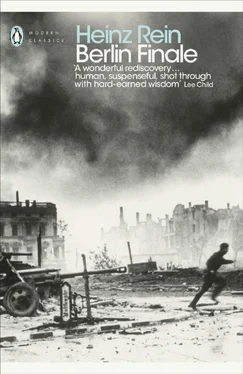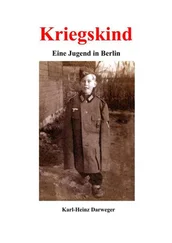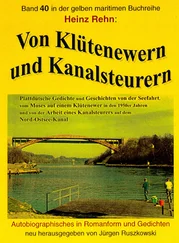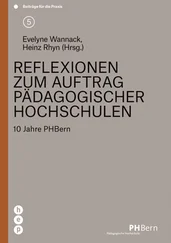When it becomes clear that no one can still be alive in the basement in Schmidstrasse because it is full to the ceiling with water, the digger stops work and is withdrawn. When it is dragged away by a tractor, Eckert undergoes a sudden transformation. Until now he has still fed the faint flame of his hope, but now he is certain that his wife and his daughter have died here, somewhere in these streets. If until now Eckert has been agitated, but still relatively calm and level-headed, now he has been gripped by an idea that won’t let him go, that spurs him on: he must find his wife and his daughter, regardless of where and how. He looks each body in the face, turns over every corpse lying on its belly and studies its ravaged features, he checks the clothing on the severed trunks and picks up skulls in his hands, he climbs among the still-smoking and smouldering ruins, he clambers into collapsed basements, forces his way down half-buried passageways. Again and again he crosses the field of rubble from Köpenick Bridge to Schmidstrasse, from Moritzplatz to Alexandrinenstasse, from Michaelkirchplatz to Neanderstrasse, he clears lumps of rock aside with his bare hands as if he thinks he might be able to reveal the entrance to a basement, he digs through buried basement windows, he has already seen hundreds of corpses and helped recover corpses from Moritzplatz underground station, he has gazed into the faces of charred and blackened human beings and not even been able to establish whether they were men or women, but it has all been in vain. He has not been able to find his wife and his daughter.
He is utterly discouraged and starving, his hands are smeared with ptomaine, he is close to complete collapse, but he is still wandering around the field of rubble. He knows that his wife and his daughter have died, but he also wants to know how they perished and where their bodies are. If they had died of tuberculosis or cancer or some revolting illness, it would have been a death that he would have experienced along with them, that would have been established in the people themselves, that would have corresponded to traditional views of dying. Then he would have walked behind a corpse and thrown three handfuls of earth into the open grave, he would have known where a mound would be heaped and later a marble headstone raised, but like this he doesn’t know anything. He can’t grasp that the two of them are simply no longer there, vanished, trampled, scattered, simply no longer there. The imagination of this simple man is then sparked by the gruesome, terrible images that he has seen that day and which are still before his eyes. He sees his wife and daughter sitting on a bench as they always sat in the shelter of their building, with their shoulders hunched and their arms pressed tight against their bodies, knees together, with quivering jaws and darting eyes, clutching damp cloths, ready to press them to their mouths at any second, goggles pushed up on their foreheads, prepared to bring them down over their eyes, he sees them sitting there, every fibre of their bodies attuned to the slightest noise from outside, the singing of the engines, the thunderous roar of the anti-aircraft guns, the whirring, droning and whistling of the bombs plummeting towards them. He sees them sitting there for only a second, even before they can conceive a thought, before the event hurtling towards them can spark a reflex in their brains and enter their consciousness, in that second the basement ceiling coming down on them like an elemental fist. It happened without them seeing, hearing, feeling anything, even though hundreds of alarms had prepared them for it.
It could have happened like that, but it could also… Eckert can no longer halt his imagination, again and again it feeds on the molten streams from the corpse-scattered field around him. He is, like everyone else, trapped in the world of empirical thought, and lacks the experience of those whose mouths are sealed for ever because they are already beyond Lethe, but the imagination distorts outlines and darkens the colours of the images.
Might it not also be that when everything was burning, heat, anxiety and breathlessness assailed them when the way out of the basement was blocked by scorching flames, when the hole in the wall suddenly opened up and the fire in the next-door basement blocked that escape route too? Might it not be that the flames leaped at them with greedy, clutching fingers, darted glowing tongues into their flesh and turned them into ashes or arm-length stumps of charcoal, or that smoke and fumes hurled them to the ground and slowly choked them to death? Might it not be that they had time to think lots of thoughts and feel terrible emotions, sudden fear, oppressive anxiety, deadly terror, ungraspable dread, paralysing horror?
Might it not also be that they were buried in an avalanche of rubble, trapped in a dark grave, and that the water began to spout from a burst pipe, ran and ran, unstoppable as a waterfall, spilled over the basement floor, rose, slowly but steadily, climbed up the people, held them in its wet clutches, blood rose to the brain and paralysed it, flooded the lungs and halted the breath? Or perhaps a pipe was bent and the gas started flowing, an invisible, deadly cloud began to spread over the basement, first floated to the ceiling and then fell back down on the people, made their eyes flicker and struck up an unbearable roaring noise in their ears, enfolded them in a stupor and gently led them into a state of torpor, sealed their tissue and drove their breath away, turned their blood bright red and discoloured their mucous membranes?
Might a lump of rock not have pulled them down and fixed them to the floor as a wrestler holds his defeated opponent on the mat, perhaps the burden pressed down on body or legs, but did no more to them, it only held them tightly, let them breathe, think, feel and even speak, but held them in a stony grip and made the place where the block of stone had struck them the last and unalterable site of their lives, so that only a great miracle could have swept it away and freed them, so that their lives under the stone clamp in the dark vault of the caved-in basement gasped their last and their bodies ceased to function with tortuous slowness?
Or perhaps nothing happened to them except that they were trapped in a subterranean vault, that they were still walking around in it, conferring and knocking against ceiling and wall, but no one heard their knocking because huge mountains of rubble were spread above them, that now, while he, Eckert, climbs over scree slopes, they are still alive and hoping to be freed, but that hope is becoming ever thinner and more fleeting, despair and madness are inflamed in their brains, the more hunger and thirst and darkness take hold of them, the more unlikely it becomes that someone will find their stony grave and free them from it?
The tram conductor Eckert stands on the threshold of that world to which there is no access, which no human eye has looked upon, whose wall can be penetrated only by the mind, and of which there is no likeness, only a cold, grim uncertainty.
He knows the word ‘missing’, but so far it has meant nothing to him, he has read it and spoken it, but associated nothing more with it. In his life he has used many words thoughtlessly and superficially, without filling them with a concept. One of those is the word ‘missing’, it has slipped smoothly from his tongue in the past, but now it stands before him as if in physical form, a monster, gigantic, with gaping jaws and crushing teeth, with scornfully grinning, bloodshot eyes and long, rapacious arms: missing. Now he knows what it means to bump into the void, to let thoughts, hopes and longings circle around a deadly uncertainty: missing. Never having complete certainty, sending your thoughts time and again to the basements and tunnels, caves and craters, time and again hypothesizing that they might have been crushed by boulders, drenched in water, numbed by gas, slung into the air by exploding shells, gnawed by rats, whether their cries slowly faded gasping away, or whether the life fled quickly from them: missing.
Читать дальше












